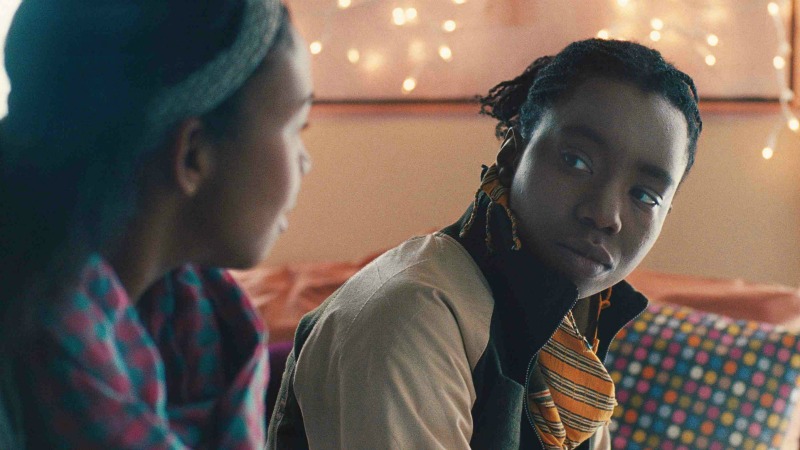@northstarpics #PariahMovie
Adepero Oduye (right) with Aasha Davis. Photo credit: Focus Features
If you’ve been hearing a lot about Dee Rees’s directorial debut Pariah lately, there’s a good reason for that: It’s really good. It’s an intimate film, one that tells a specific story with only the characters necessary. At the same time, it has universal appeal. So, what you’re sensing is well-deserved buzz, and the introduction of both a filmmaker and lead actress to watch.
While it’s a coming-of-age story, to describe the film that way does it a disservice. No one should go into the film thinking they’re going to watch a young black woman struggle with questions about her own sexuality. Rather, Pariah tells the story of a young woman who’s trying to figure out how she can be the lesbian that she’s clear she already is. Her struggle is to find or create a place that accepts her for who she is.
At a post-screening Q&A, director Rees said: “She loves women. That’s not the issue. She’s trying to figure out how to be.”
 As portrayed by Adepero Oduye (with Charles Parnell, left), Alike (a-lee-kay) is a smart, creative and shy poet, and very clear about her attraction to other women. Where she struggles is fitting into the pickup scene at the women’s club that her friend Laura drags her to regularly. She’s a bit of a loner at school. And to make matters worse, she also doesn’t fit into the family image that her church-going mother, portrayed by Kim Wayans, has constructed.
As portrayed by Adepero Oduye (with Charles Parnell, left), Alike (a-lee-kay) is a smart, creative and shy poet, and very clear about her attraction to other women. Where she struggles is fitting into the pickup scene at the women’s club that her friend Laura drags her to regularly. She’s a bit of a loner at school. And to make matters worse, she also doesn’t fit into the family image that her church-going mother, portrayed by Kim Wayans, has constructed.
However, in one regard, Alike isn’t alone: Like her, almost every character in the film is a pariah, in one way or another. Her father, while close to Alike, is estranged from his wife, her mother. Alike’s best friend, Laura, has been kicked out of her home because her mother disapproves of her being a lesbian. And Kim Wayans’ character is clearly not welcomed into the circle of other nurses at the hospital where she works.
One of the things the film does very well is convey that sense that being a lesbian is still not accepted, particularly in the black community. Many of the characters talk about strained relationships with their parents and families once they came out. There is a palpable sense of women struggling to find and create community. They exist in-between: There’s a scene where one woman lets another crash on her couch, but tells her she has to be out before her roommate gets home from working an overnight shift. The message: It’s just easier that way.
Kim Wayans is a revelation. For those of us who knew her from her In Living Color days, she was a comedian and, honestly, not one I held in high regard. However, in Pariah, she surprised me with a powerful performance that completely upended any previous notions I had of her. She seems to have taken a page from Carol Burnett’s Mary Tyler Moore’s portrayal of the mother in Ordinary People and ran with it. Like Burnett’s Moore’s character, Audrey’s inflexibility in borne out of a similar profound loss: Her eldest daughter will never be the woman she envisioned. Add to that, strains in her marriage that existed prior to the start of the film, and you’ve got woman saddled with disappointment, trying to keep up appearances, and failing all the way around.
The other great thing about the film is the music. As I mentioned earlier, the filmmakers took the opportunity to buttress a story about outsiders with a lot of left-of-center music. Great to see longtime fam like Honeychild Coleman and Tamar-Kali have their music placed in a feature film. And this is no spoiler: There’s a houseparty scene where Tamar-Kali and her band perform “Pearl,” and it’s great to see her 20-feet tall on the screen, putting her foot in it with all of her geechee goddess glory.
One thing that’s pissing me off has nothing to do with the film. Reviewers from the New York Times’ Stephen Holden to film blogs like The King Bulletin do their best to lump this film in the same category as Precious. Yes, both are about black families and both films premiered at Sundance (Pariah’s cinematographer Bradford Young received the 2011 Excellence In Cinematography Award), these two films couldn’t be more different. Unlike Precious, Pariah is nowhere near a “domestic horror movie”. This is laziness on both these reviewers parts. “Look, a black film at Sundance! Reminds you of Precious, doesn’t it?” Whatev.
It’s worth stating that while Pariah deals with the personal struggle of a young, black lesbian, audiences should not write it off as “just a LGBT” movie. Yes, it provides a glimpse at how one young woman affirms the fact that she loves women and, yes, we see the impact that has on those closest to her. But at its core, Pariah is a universal story of young woman gaining the confidence to declare her individuality.
Alike’s voiceover at the end says it all, “I’m not running. I’m choosing.”
Additional links:


